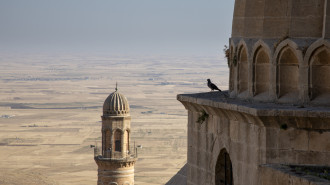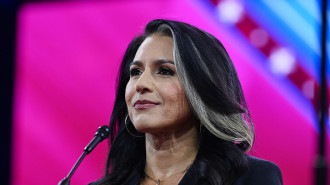Thousands flee Diyarbakir as Turkey expands curfew
Thousands flee Diyarbakir as Turkey expands curfew
Thousands have fled a predominantly Kurdish region of Turkey as authorities expanded a curfew after three soldiers were killed in clashes with PKK-linked Kurdish militants.
3 min read
Thousands have fled clashes and curfews in predominantly Kurdish areas [Getty]
Thousands of people fled a district of the mainly Kurdish city of Diyarbakir in southeastern Turkey on Wednesday after authorities fighting Kurdish militants there expanded a 24-hour curfew to include five more neighborhoods.
Meanwhile, three soldiers were killed in an attack in Diyarbakir's historic Sur district, which has been under a curfew since December as the security forces battle Kurdish militants who are linked to the outlawed Kurdistan Workers' Party, or PKK.
The private Dogan news agency reported heavy fighting in Sur, where the military says at least 134 "militants" have been killed since December.
A statement from the local administrator's office for Sur said the curfew — which bars residents from leaving homes and observers or journalists from entering to monitor the fighting — was enlarged to enable the security forces to "restore public order" in neighborhoods where the militants had allegedly dug trenches and set barricades and explosive devices.
Authorities have been imposing curfews in towns and districts to flush militants from urban areas in Turkey's mostly Kurdish southeast since the collapse of a peace process with the PKK in July.
The Turkish Human Rights Foundation says at least 198 civilians, including 39 children, have died in combat areas under curfew since August.
On Wednesday, Human Rights Watch raised concerns over the civilian casualties - faulting the government for not releasing numbers or facilitating urgent medical evacuations for trapped civilians — as the operations continue.
"Many people have died in circumstances which are extremely difficult to scrutinize because of the curfews" and a broader crackdown on the media, said HRW senior Turkey researcher Emma Sinclair-Webb.
Turkish authorities used watercanon to impose the curfew as part of a security crackdown in the area.
Deputy Prime Minister Numan Kurtulmus told parliament Tuesday the security forces were taking utmost care to "distinguish between the terror organization and the civilians and to ensure that the battle is being waged within the rule of law."
An Associated Press journalist on Wednesday witnessed more than 2,000 people leaving Sur as the expanded curfew was announced.
People were seen moving bedding, heaters and washing machines on carts, pulling suitcases and carrying cages with their pet canaries.
Mehmet Karatay, 55, said he moved to Sur in the early 1990s after the security forces burned down several villages in the southeast as part of the battle against the PKK.
"I have 10 children," Karatay said. "There are thousands of miserable people like me. Where will we be going from now on?" he asked as he left Sur.
Meanwhile, three soldiers were killed in an attack in Diyarbakir's historic Sur district, which has been under a curfew since December as the security forces battle Kurdish militants who are linked to the outlawed Kurdistan Workers' Party, or PKK.
The private Dogan news agency reported heavy fighting in Sur, where the military says at least 134 "militants" have been killed since December.
A statement from the local administrator's office for Sur said the curfew — which bars residents from leaving homes and observers or journalists from entering to monitor the fighting — was enlarged to enable the security forces to "restore public order" in neighborhoods where the militants had allegedly dug trenches and set barricades and explosive devices.
Authorities have been imposing curfews in towns and districts to flush militants from urban areas in Turkey's mostly Kurdish southeast since the collapse of a peace process with the PKK in July.
The Turkish Human Rights Foundation says at least 198 civilians, including 39 children, have died in combat areas under curfew since August.
On Wednesday, Human Rights Watch raised concerns over the civilian casualties - faulting the government for not releasing numbers or facilitating urgent medical evacuations for trapped civilians — as the operations continue.
"Many people have died in circumstances which are extremely difficult to scrutinize because of the curfews" and a broader crackdown on the media, said HRW senior Turkey researcher Emma Sinclair-Webb.
Turkish authorities used watercanon to impose the curfew as part of a security crackdown in the area.
— Hârun Ercan (@haarunercan) January 27, 2016
" style="color:#fff;" class="twitter-post-link" target="_blank">Twitter Post
|
Deputy Prime Minister Numan Kurtulmus told parliament Tuesday the security forces were taking utmost care to "distinguish between the terror organization and the civilians and to ensure that the battle is being waged within the rule of law."
An Associated Press journalist on Wednesday witnessed more than 2,000 people leaving Sur as the expanded curfew was announced.
People were seen moving bedding, heaters and washing machines on carts, pulling suitcases and carrying cages with their pet canaries.
— Sosyalist Lider (@SosyalistLider) January 27, 2016
" style="color:#fff;" class="twitter-post-link" target="_blank">Twitter Post
|
— Diba Nigar Goksel (@nigargoksel) January 27, 2016
" style="color:#fff;" class="twitter-post-link" target="_blank">Twitter Post
|
Mehmet Karatay, 55, said he moved to Sur in the early 1990s after the security forces burned down several villages in the southeast as part of the battle against the PKK.
"I have 10 children," Karatay said. "There are thousands of miserable people like me. Where will we be going from now on?" he asked as he left Sur.







 Follow the Middle East's top stories in English at The New Arab on Google News
Follow the Middle East's top stories in English at The New Arab on Google News
![Israel demolished homes in the Silwan area [Getty]](/sites/default/files/styles/image_330x185/public/2024-11/GettyImages-2183868368.jpg?h=199d8c1f&itok=TweR8vd0)

